- Home
- Peter Carey
Oscar and Lucinda Page 49
Oscar and Lucinda Read online
Page 49
“Oh, no,” he said. “It is my friend,” he said to Clarkson who nodded but did not seem to understand what was being said to him. “My friend,” he said to little plump Maguire who rubbed his stomach as if he were being spoken to about a meal, or lack of a meal, but not this: that the man who should be dressed in a black cassock in a pulpit was here standing before them on a raft.
“Hopkins,” bellowed Wardley-Fish. He cupped his hands and called again: “Mr Oscar Hopkins.”
“What chaps are these?” Maguire said. He had a little brass telescope he always carried with him on to the deck. Now he raised it and pointed it at the barges.
“It is my friend,” said Wardley-Fish. “Mr Hopkins from the Randwick vicarage.”
“Then wave,” said Clarkson, setting the example himself. “Yoo-hoo,” he cried in a mocking imitation of a woman. “Yoo-hoo, Mr Randwick.” He turned to Wardley-Fish. “Wave,” he said. “Your friend is leaving on an expedition to the inland. Wave, Fish, you will not see him for a year.”
Wardley-Fish looked at Clarkson and knew that Clarkson did not like him, had not forgiven him, would not forgive him.
“Liar,” said Wardley-Fish.
“I beg your pardon, sir?”
“Poppycock,” revised Wardley-Fish who could not afford to waste time on this sort of petty discord but must find out, and rapidly at that, whether he was having his leg pulled or no.
“Is it someone famous?” asked Maguire, taking off his spectacles and readjusting the little telescope.
“Is it true?” asked Wardley-Fish, quietly, politely.
Clarkson poured himself rum but offered none. “You see that wagon there,” he said, pointing with his eyedropper, “with its two boats fitted one inside the other? See that? Then tell me, Fish, why someone has a wagon like that, if they are not setting off to go exploring. And criminee, man, just look at them. Did you ever see such a lot of tin soldiers?”
The barges were being pulled out across the water by a little steamboat. Wardley-Fish removed his jacket and laid it loosely across the rail. He took off his clerical collar and placed this across the jacket. He slipped the studs in his pocket.
No one took any notice of him, not even when he bellowed: “Mr Oscar Hopkins.”
Clarkson sipped his rum and cloves. Maguire leaned his belly against the rail and focused his telescope. Wardley-Fish clambered on to the rail and having first removed his shoes in full view of the Halfsmiths, Miss Masterson et al., dived head first into Sydney Harbour.
This was the “drowning man” who had a boathook driven into his breeches.
96
Arrival of Wardley-Fish (2)
The man who was saved from drowning had a backside like a horse and a bulk—so claimed Alfred Spinks, the deckhand who had so neatly hooked him—enough to cause a bloke a hernia. The hook got in the breeches without the gentleman’s soft white bum getting so much as a scratch on it. The man was saved from drowning but did not want to bestow a reward. He was a New Chum of the lah-di-dah variety, a remittance man no doubt with nothing in his pockets and cheap rum on his breath.
Alfred Spinks, his spot of rescuing now done, stood in the wheelhouse with his foot shoved hard to bring the wheel round to the starboard. They would circle now while wall-eyed Captain Simmons—it was the leathery shrunken pilot with the silver beard—did a spot of questioning. It would be a rare old show, for Captain Simmons liked a reward as well as the next chap and he had a great aversion to New Chums and an even greater aversion to taking orders, and he was already turning his wall-eye towards the rescued man and his winking eye towards the appreciative Alfred Spinks.
The rescued man had a gold tooth and a mole on the edge of his fair beard which was easy to mistake for a shell-backed tick. “I will ask you one more time,” the pommy said—you would think he was a frigging magistrate—“I will ask you one more time to deliver me to that place where the expedition barges are bound.”
He was so bloody proper and dignified. It was a shame you could see his titty through his shirt. It was shocking that he had to cough and spit up all that smelly water.
Captain Simmons lowered himself companionably beside the dripping man. Above his head the funnel farted black soot into the sky. “I was not aware,” the pilot said, “you had a rank.”
“A rank?”
“Yes, sir, a rank. An admiral, a vice-admiral, someone who is entitled—in certain circumstances—to give orders to the captain of a pilot boat.”
“I am a gentleman, you knave,” said Wardley-Fish.
“You must not call me knave, sir. I am a captain.”
This answer made Wardley-Fish narrow his eyes. If all of New South Wales was like this, why then, it was beyond toleration—nothing would get done. You could not argue with a man about whether he was a knave or not.
“I am a gentleman,” he said.
“And I am a captain, and it’s the other captain I must take you to visit, not go running you across the harbour.”
“What other captain, man?”
“The Captain of the Sobraon, the Captain from whose authority you have thought to run away.”
Wardley-Fish sprang to his feet, but the blessed boat was so small there was nowhere to go. In two paces he was at the wheelhouse where he met the possum-bright eyes of Arthur Spinks. He looked up at the Sobraon but its decks were now crowded with faces, all carefully observing his public disgrace.
“I beg you, man,” he hissed at Captain Simmons.
A smile stirred in the depths of Captain Simmons’s silver beard.
“You do not look like a begging sort of man,” said Captain Simmons, and began to tamp his tobacco with a broad black thumb.
Wardley-Fish cast another look towards the decks of the Sobraon. He caught the eye of Miss Masterson, she who, not five weeks before, he had imagined he was in love with. She did not avert her gaze, but neither did she smile. She looked down on him as if he were some species of marsupial rat.
The barges were now a quarter of a mile away. Wardley-Fish considered swimming but knew he was too drunk for it.
“Why do you take it to act so uncharitably?” he asked the captain.
Captain Simmons thought that pretty rich: charity. But he said nothing.
“If you are a captain,” said the gent, “you must be the slowest-witted captain on the sea. I told you once, I told your man here twice—I only wish to see my friend. He is over there. There he goes. I have travelled all the way from London to see him. And he is there, damn you, and you will not take me. Take me, please, I beg you,” cried Wardley-Fish, but his manner, as the Captain had previously observed, was not that of a begging man.
“So he was on his way to see his friend,” Captain Simmons exclaimed to his deckhand. “Is this the case?”
“You know it is,” said Wardley-Fish.
“And yet, you know, I have the damnedest feeling that there is a problem of a friend behind you, some problem perhaps, a little debt incurred whilst gambling, or a matter between you and the purser on the Sobraon, some little thing like that which made this ‘friend’ you saw upon the barge seem like a chap you must get in touch with urgently, if you get my meaning.”
“Oh, you have a beastly, tricky little mind,” roared Wardley-Fish. “Would you like money? I will give you five pounds if you take me where that barge has gone.”
Captain Simmons stood slowly. He tucked his pipe in his trouser pocket. “Ten pounds,” he said.
Wardley-Fish was caught in the tug of different violent passions—his outrage at being robbed of ten pounds, his realization that he did not have ten pounds, that it was in his jacket aboard the ship, his knowledge that this hawk-nosed little chap would enjoy refusing credit, his mortification at disgracing himself in the eyes of the entire ship, his grief at missing his friend, his anxiety that all was not right with the Odd Bod who had seemed, in that ridiculous shirt and criss-crossed braces, like a poor fowl trussed up for a cooking pot. It was all of this, not his simple dislike
of the sly aggressions of the pilot, that led him to pick the man up bodily in his bearlike arms and, with a terrible roar that could be heard by all aboard the Sobraon, hurl him into the water.
The incident created complications that kept him a prisoner in Sydney for two days. On the third day he set off in search of Mr Jeffris’s expedition.
97
Laudanum
He had accepted the laudanum for three days because Percy Smith had begged him to, but now he was resolved he would accept it no more. The laudanum did not suit him. It gave him unsettling dreams. It made him nauseous and jittery. It also produced severe constipation and now he had haemorrhoids and his anus itched and bled continually. He had no experience of haemorrhoids and imagined a condition far more serious. He had dreams involving shit and blood, the buggered carpenter, and the endless ridge roads out of Sydney, which laced through his imaginings like the stretched intestines of a slaughtered beast.
The others had all washed. He had not washed. He would not stand naked before them. He splashed water on his face and forearms and calves, but the rest of his body felt cased with a grimy viscous film. His modesty was somehow offensive to the party. Mr Jeffris suggested that it would be in his interests “to reassure the men that you have all the correct equipment.”
Oscar had never hated anyone before (not even they who made him eat a stone, or those who had let rats loose in his room at Oriel) but he hated Mr Jeffris who was now, on the fourth morning of their journey, strutting around the dead brown dew-wet grass finding fault with his “soldiers” and their wagons.
Oscar and Mr Smith stood beside their wagon. Mr Smith had the laudanum bottle perched on the metal step and the funnel stuck in the pocket of his twill trousers.
“I do not have the strength to defy him,” he said, crossing his burly, sandy-haired arms.
“Then we will pretend,” said Oscar. “You will pretend to pour. I will pretend to drink.”
“No,” said Percy Smith. “He will know.”
Percy Smith had a kindly, decent face, one you would naturally trust to the end of the world. But Mr Jeffris had such a power over him that when Oscar looked at his face he was reminded of a rabbit on a laboratory bench assaulted by current from a voltaic cell.
“I am employed by him,” pleaded Percy Smith, blinking.
“Look at him. He is too busy to know anything.”
Mr Jeffris pulled at a rope on the lead wagon in such a way that a vast lumpy canvas swag fell to the earth.
“If you wish to change his orders, you must settle the matter with him.”
“Oh, mercy,” cried Oscar in despair. “You were there when I attempted it.”
“And he said it could only be settled with Miss Leplastrier present. He does not accept your authority. But I must accept his. Dear Mr Hopkins, you are a good man—”
“An angry man.”
“A good man, and I must ask you, please,” said Percy Smith, sneaking his hand around Oscar’s shoulder and suddenly clamping it around his jaw, “you must forgive me.”
“No,” said Oscar. The back of his head was jammed hard against the buckle of Mr Smith’s crossed white braces. He was pulled back and down, out of the shadow of the wagon. The sun laid a stripe across his livid face. A blow-fly settled on his nose. He tried to wave it away. Mr Smith clamped his wrist with his other hand. Two bullocks in the carpenter’s team defecated at once. Mr Jeffris was bawling out the cook and threatening to make him walk without his boots. And at this moment, with Percy Smith’s hand held around his jaw, Oscar thought: I do not even know where I am.
Percy Smith had found the funnel and pushed it hard against his lips. Oscar opened his mouth. It hit his teeth. He opened more. He had already been cut. He could taste the blood. Percy Smith’s breath was bad. He had his knees against the back of Oscar’s knees, making him keel over backwards.
“No,” Oscar said, or tried to say, for trying to speak made him dry-retch.
Percy Smith lowered him to the ground. Oscar did not struggle. His friend put a knee upon his chest. He had the stone bottle with “Manufacturing Chemists” engraved in brown upon its rotund middle. He pulled the cork with his teeth. And then, before he poured, he put the bottle down. He touched Oscar’s cheek with the back of his hand. An odd, gentle, lover’s pat. “I would not do this to you,” said Percy Smith, “for anything.”
And then he poured the muck into the funnel.
Oscar kicked out with his boots. He connected with nothing. He hated Percy Smith.
98
An Explorer
Until he had the ill fortune to imagine a glass church and therefore be obliged to take this journey, Oscar’s knowledge of the world had been severely limited. He was, by his nature, a creature suited to burrows and hutches and so even at Oriel—which many would see as a civilized and unthreatening environment—he had his definite tracks beside which there were great unexplored areas he was either frightened of or had no interest in.
His knowledge of Hennacombe was confined to two households and various red—soiled paths no more than one foot wide. And although he had, in the very act of writing home, posed as an authority on Sydney, had been happy to relay the common platitudes (that it was, for instance, a working-man’s paradise) he had known nothing of it.
Now he felt himself cast into a morass and little dreamed he was dragging his puffing, saddle-sore friend, the bewildered Wardley-Fish, through the muck behind him. He felt himself a beetle inside the bloody intestines of an alien animal. And any idea he had harboured that the bush was, as the engravings of the Sydney Mail might suggest, a pure and pristine place of ferns and waterfalls was soon demonstrated to be quite false. There were ferns, of course, and waterfalls. There were clouds of splendid birds but this was not the point.
At Maitland, Wardley-Fish had been barely a day behind the party, but then there was a game of cards with squatters in a so-called Grand Hotel. He had tried to leave, but he was too far ahead and his companions would not hear of it. By the time this game was finally settled Mr Jeffris’s squeaking, whip-rattling convoy was far ahead: passing along burning ridges somewhere north of Singleton. The Odd Bod’s eyes streamed. His lungs rebelled. His hard-sprung wagon lurched and banged over rocky tracks or squelched into fart-sour mud. The Odd Bod sat on a wooden bench and buttoned his long-sleeved shirt against the mosquitoes and the sun. He comforted the burly Percy Smith. He assured him that he was forgiven. The air was filled with foul language, such hatred of God as Oscar would have imagined suitable for hell itself. They travelled behind the quartermaster’s wagon and thus behind the smell of bad meat which made up their diet. They travelled beside ugly windrows, great forest trees pulled into piles by settlers eager to plant their first crops.
In a pretty clearing beside some white-trunked paper-barks, Oscar saw a man tied to a tree and whipped until there was a shiny red mantle on his white shoulders and brown seeping through his Anthony Hordern’s twill trousers. His “mates” all watched. Oscar prayed to Jesus but no prayer could block out the smell of the man’s shit.
He forgave Mr Smith. How could he not? He who stood witness to far greater crimes than his. He accepted his laudanum. He lay down on the grass and let the funnel be inserted. He had queer laudanum dreams and other thoughts you could not label so neatly.
If you plucked Sydney from the earth, he thought, like an organ ripped from a man, all these roads and rivers would be pulled out like roots, canals, arteries. He saw the great hairy, flesh-backed tuft, which he saw was Sydney, saw the rivers pushing, the long slippery yellow tracks like things the butcher would use for making sausages.
While he saw all this, he also saw Percy Smith’s unhappy, pale, blinking eyes as he handled his blackened short-stemmed pipe.
He saw his father killing moths by driving copper pins into their eyes.
He dreamed of enormous sea-shells, soft, like ladies’ quilted jackets—pale pink, lilac, lily green—cast up on a Devon beach.
He had ecstatic d
reams involving water in one of which his body assumed the form of a river.
His anus itched. His head was jolted and thrown forward. Through all the physical discomforts, the dreams came to him, like complicated melodies played by a man lying in a bed of nettles.
He dreamed he was somehow inside his father’s aquarium. The cool water was very soothing to his prickling skin. He could see his father’s wise and smiling face peering in at him. He could see, dimly, the outside world, the chair and benches of his father’s study. Sunlight streamed through a window. He thought: That window faces north. He felt very happy for he knew that the sunlight meant his father was now in the southern hemisphere.
But it was Wardley-Fish who was in the southern hemisphere. He was one day’s fast trot behind the wagons. He had a tired horse, but plenty of money for a fresh one. He walked the dark-flanked beast along the flat sandy path above the Macleay. The path was through tea-tree scrub. He came round a bend to find a man with a handkerchief tied across his face. As the man produced his pistol, bright loud birds flew across the path behind his shoulder.
Oscar had dreams in which portions of the real world stumbled, like horses’ hooves stuck in drought-cracked clay. These dreams were marked by the filigree of giant trees silhouetted against the sky, by beards, by curses, and the plant collector’s German hymns.

 True History of the Kelly Gang
True History of the Kelly Gang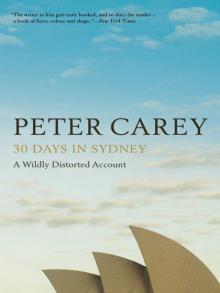 30 Days in Sydney: A Wildly Distorted Account
30 Days in Sydney: A Wildly Distorted Account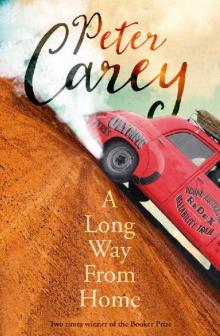 A Long Way From Home
A Long Way From Home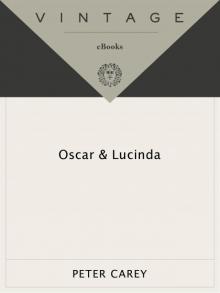 Oscar and Lucinda
Oscar and Lucinda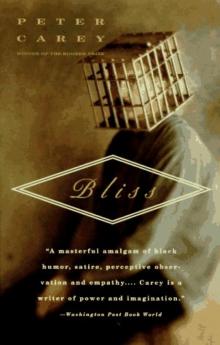 Bliss
Bliss Wrong About Japan
Wrong About Japan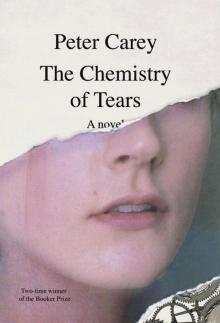 The Chemistry of Tears
The Chemistry of Tears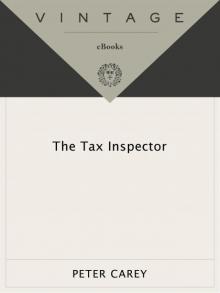 The Tax Inspector
The Tax Inspector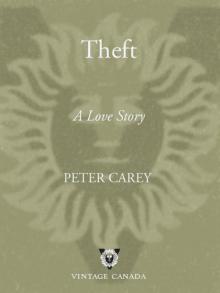 Theft: A Love Story
Theft: A Love Story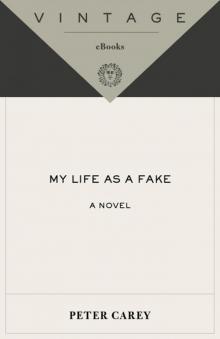 My Life as a Fake
My Life as a Fake Collected Stories
Collected Stories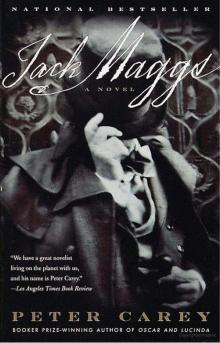 Jack Maggs
Jack Maggs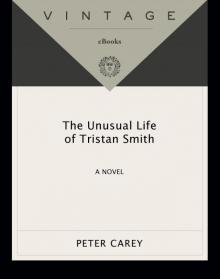 The Unusual Life of Tristan Smith
The Unusual Life of Tristan Smith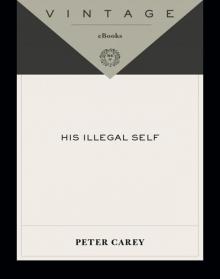 His Illegal Self His Illegal Self His Illegal Self
His Illegal Self His Illegal Self His Illegal Self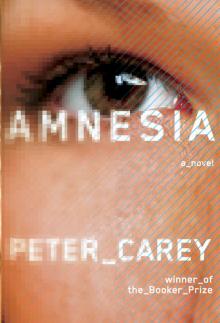 Amnesia: A Novel
Amnesia: A Novel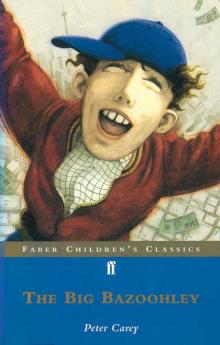 The Big Bazoohley
The Big Bazoohley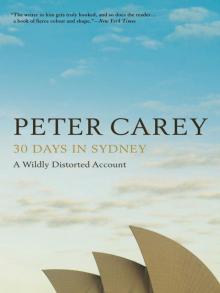 30 Days in Sydney
30 Days in Sydney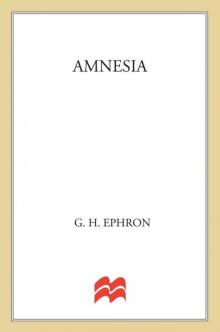 Amnesia
Amnesia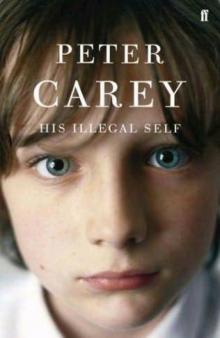 His Illegal Self
His Illegal Self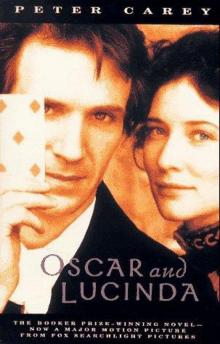 Oscar and Lucinda bw-1988
Oscar and Lucinda bw-1988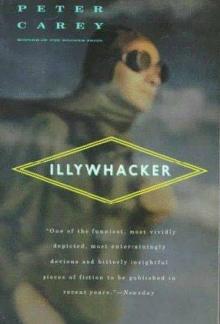 Illywhacker
Illywhacker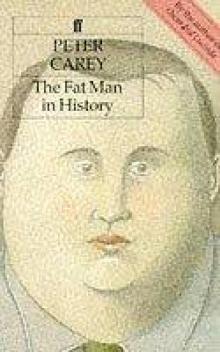 The Fat Man in History aka Exotic Pleasures
The Fat Man in History aka Exotic Pleasures